As a recruiter, you know the pressures of sourcing the right talent for the production floor. Production workers are the backbone of manufacturing operations, ensuring that production lines run smoothly and efficiently. Yet, many companies struggle with hiring for this role due to misconceptions about the skill set required. Identifying candidates who not only have the technical knowledge but also the right soft skills is key.
This blog post will guide you through the nuances of hiring production workers. We'll cover everything from crafting the perfect job description to choosing the right platforms for posting your job openings. Additionally, you'll find insights into assessing candidates using skills tests and structuring impactful interview stages. For more on specific skills required for production workers, check out our detailed skills guide.
Table of contents
Why Hire a Production Worker?
Hiring a production worker can help address specific challenges in your manufacturing process. For instance, if you're facing bottlenecks in assembly line operations or need to increase output without compromising quality, a skilled production worker can be the solution.
Before committing to a full-time hire, assess if your production needs are consistent enough to justify it. For short-term or fluctuating needs, consider temporary staffing or contract workers to maintain flexibility while meeting production goals.
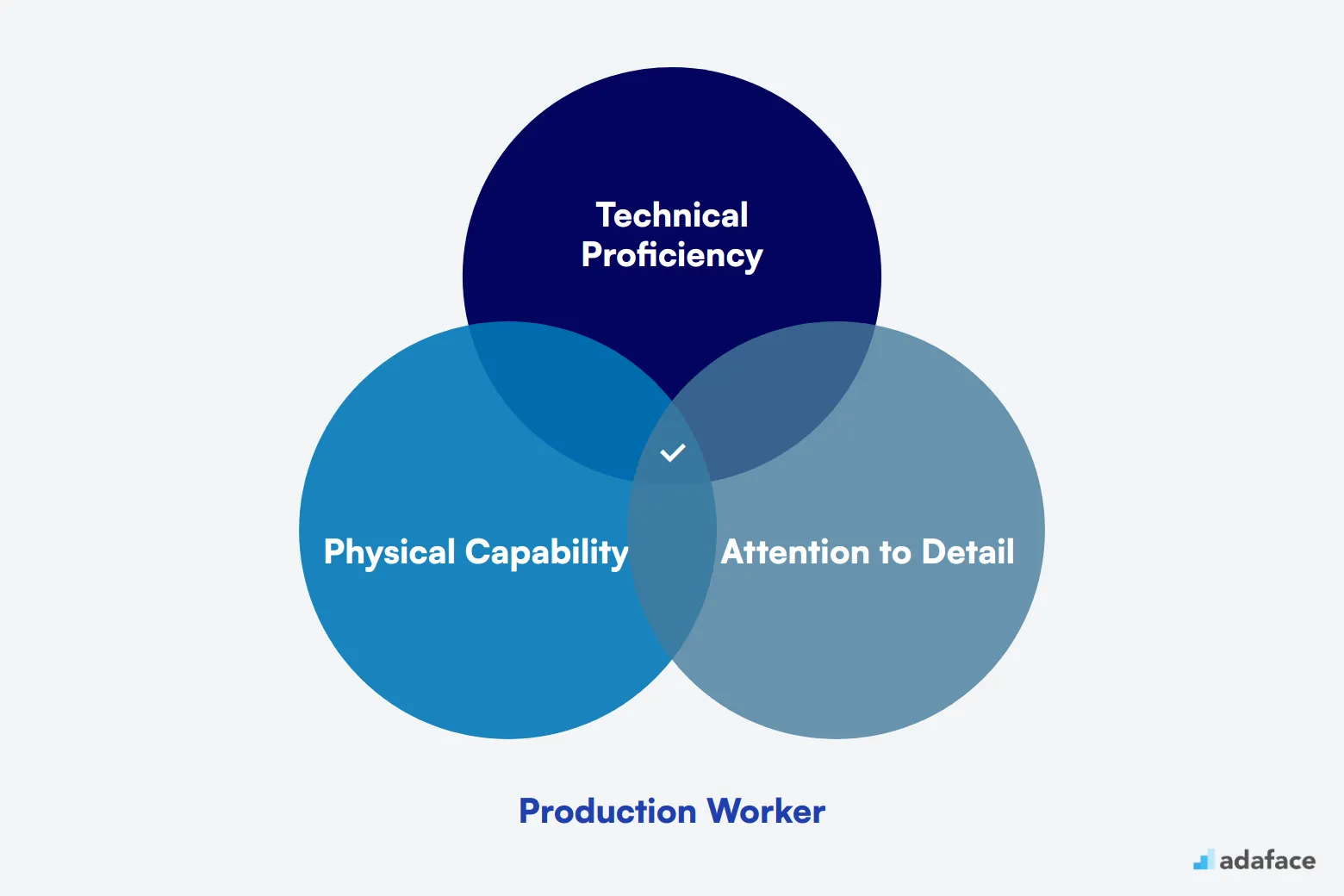
What does a Production Worker do?
A Production Worker plays a key role in manufacturing facilities, assembling products and operating machinery. They are responsible for ensuring the smooth flow of production processes, maintaining quality standards, and contributing to the overall efficiency of the manufacturing line.
The day-to-day tasks of a Production Worker typically include:
- Operating and monitoring production equipment
- Assembling components according to specifications
- Performing quality checks on finished products
- Following safety protocols and maintaining a clean work environment
- Collaborating with team members to meet production targets
- Reporting any issues or malfunctions to supervisors
- Packaging and preparing items for shipment
Skills and Qualifications to Look for in a Production Worker
Hiring for a Production Worker role can be tricky because the skill set often varies with each company's unique needs. It's essential to draw a clear line between what's required and what's preferred for your organization. For instance, while a high school diploma may be a must-have, knowledge of lean manufacturing principles might be a beneficial addition, not a necessity.
In this role, the required skills often include a high school diploma or equivalent, physical stamina, and basic math and reading skills. These ensure the candidate can handle the job's physical demands and understand instructions. Equally important is attention to detail and the ability to follow safety procedures effectively.
Preferred skills can set candidates apart. Experience in manufacturing, familiarity with hand tools, or forklift certification can be beneficial. Additionally, knowledge of lean manufacturing principles or basic computer skills can make the hiring decision easier for a recruiter.
| Required skills and qualifications | Preferred skills and qualifications |
|---|---|
| High school diploma or equivalent | Previous experience in manufacturing or production |
| Physical stamina and ability to stand for long periods | Familiarity with hand tools and basic machinery |
| Basic math and reading skills | Knowledge of lean manufacturing principles |
| Attention to detail and quality control | Forklift certification |
| Ability to follow safety procedures and guidelines | Basic computer skills |
How to write a Production Worker job description?
Once you've defined your candidate profile, capturing that in a compelling job description is the next step to attract the right talent. Crafting a Production Worker job description requires clarity and precision.
- Highlight key responsibilities and impact: Clearly outline the daily tasks and responsibilities, such as operating machinery, maintaining production quality, or collaborating with team members, and explain how these contribute to your company's success. Specific details can help candidates see the role's significance within your organization, attracting motivated applicants.
- Balance technical requirements with relevant skills: While technical skills like machine operation or experience in assembly lines are important, don't overlook attributes like teamwork, problem-solving, and adaptability. Candidates who exhibit a balance of hard and soft skills can seamlessly integrate into your production environment.
- Showcase your company's unique aspects: Highlight what sets your company apart, be it innovative production techniques, growth opportunities, or a supportive team culture. These unique selling points can be appealing to prospective candidates.
For detailed guidance on constructing a job description, refer to our comprehensive Production Worker job description.
Top Platforms to Hire Production Workers
Now that we have a clear job description, it’s time to source candidates by listing the position on effective job platforms. The right platforms can help connect you with potential production workers quickly and efficiently.
Indeed
Ideal for hiring full-time production workers due to its wide reach and popularity among job seekers.

ZipRecruiter
Great for fast hiring and reaching a large pool of candidates quickly for full-time positions.

Snagajob
Best for part-time and hourly production worker positions, catering to flexible job seekers.

Among the top options, Indeed is a popular choice for full-time positions, while Snagajob caters to part-time and hourly roles. If you're looking for freelance production workers, Upwork offers a flexible marketplace. For those needing a broader reach, platforms like CareerBuilder and Monster provide extensive job listings, ensuring you attract a diverse pool of candidates.
How to Efficiently Screen Production Worker Resumes
When you're dealing with a pile of resumes for a production worker position, effective resume screening is your first step toward finding the right candidate. By focusing on key skills and qualifications, you can swiftly identify candidates who meet your requirements. This initial filter is crucial to make the interview process more manageable.
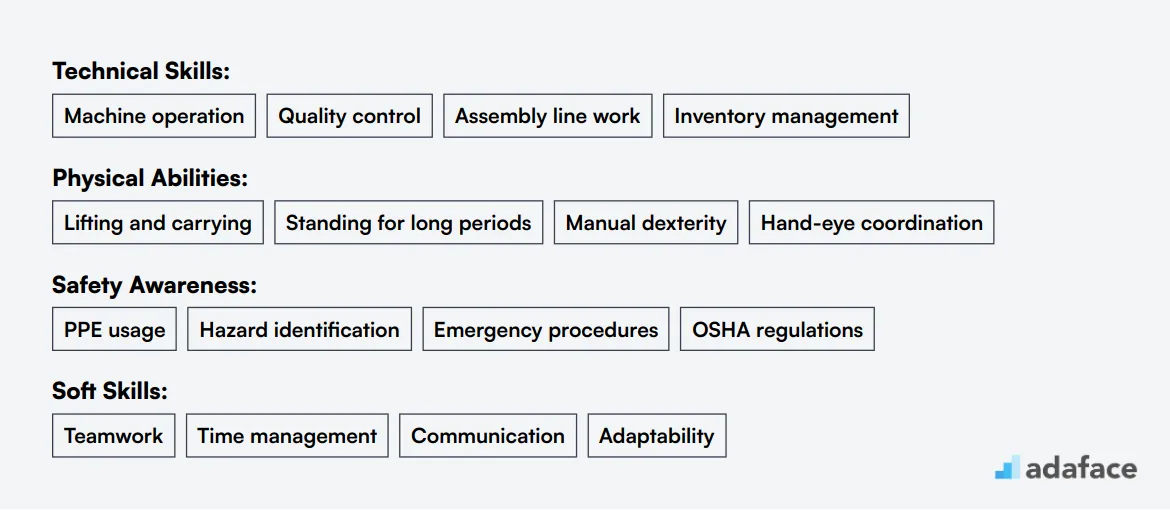
A practical approach is to first understand the primary and secondary keywords related to the role. For production workers, keep an eye out for keywords like "machine operation," "quality control," "manual dexterity," and "attention to detail." As you skim through resumes, shortlist those that match these terms to ensure they align with the job requirements. This way, you can move on to deeper levels of screening without wasting time on unqualified applicants.
Incorporating AI and large language models (LLMs) can be a game-changer for resume screening. These tools can scan through resumes and identify the relevant keywords for you. By using AI, such as Adaface's assessment platform, you can streamline the process while maintaining accuracy. This can significantly reduce the time spent on each resume, allowing you to focus on interviewing the best-fit candidates.
Here's a handy AI prompt you can use for screening production worker resumes:
TASK: Screen resumes to match the job description for a production worker role
INPUT: Resumes
OUTPUT: For each resume, provide the following information:
- Email id
- Name
- Matching keywords
- Score (out of 10 based on keywords matched)
- Recommendation (detailed recommendation of whether to shortlist this candidate or not)
- Shortlist (Yes, No, or Maybe)
RULES:
- If you are unsure about a candidate's fit, put the candidate as Maybe instead of No
- Keep recommendations crisp and to the point.
KEYWORDS DATA:
- Technical Proficiency (Machine operation, Quality control)
- Physical Capability (Lifting and carrying, Manual dexterity)
- Attention to Detail
For more insights on skills required for production workers, explore our skills guide.
Recommended skills tests for assessing Production Workers
Skills tests are an effective way to evaluate Production Worker candidates beyond their resumes. These assessments help you gauge practical abilities crucial for the role. Let's explore some key tests to consider in your hiring process.
Attention to Detail Test: Production work often requires precision and accuracy. An attention to detail test can assess a candidate's ability to spot errors and maintain quality control in manufacturing processes.
Manual Testing Test: While not all production roles involve software, a manual testing test can be valuable. It evaluates a candidate's ability to follow procedures and identify issues, which are transferable skills in production environments.
Technical Aptitude Test: Production workers often interact with machinery and equipment. A technical aptitude test can help assess a candidate's ability to understand and work with technical systems common in manufacturing settings.
Problem Solving Test: Production environments can present unexpected challenges. A problem solving test evaluates a candidate's ability to think critically and find solutions to issues that may arise during production processes.
Time Management Test: Efficiency is key in production roles. A time management test can help identify candidates who can prioritize tasks and meet production deadlines effectively.
Case Study Assignments to Evaluate Production Worker Candidates
Case study assignments can be valuable tools for assessing Production Worker candidates. However, they come with drawbacks such as lengthy completion times, lower participation rates, and the risk of losing qualified applicants. Despite these challenges, well-designed case studies can provide insights into a candidate's problem-solving skills and practical knowledge.
Assembly Line Optimization: This case study presents candidates with a scenario of an inefficient assembly line. They must analyze the current process, identify bottlenecks, and propose improvements to increase productivity. This assignment tests their ability to apply critical thinking skills in a real-world manufacturing context.
Quality Control Challenge: Candidates are given a set of product specifications and sample defect data. Their task is to develop a quality control plan, including inspection procedures and potential corrective actions. This case study evaluates their attention to detail and understanding of quality assurance principles.
Inventory Management Simulation: This assignment involves managing inventory levels for a fictional production facility. Candidates must balance stock levels, lead times, and production schedules to minimize costs while meeting demand. It assesses their ability to make data-driven decisions and manage resources effectively.
Structuring the Interview Stage for Hiring Production Workers
Once candidates pass the skills tests, the next step is to take them through technical interviews to evaluate their hard skills. While skills tests help filter out candidates who aren't a good fit, interviews are crucial for identifying the best-suited candidates for the production worker role. During this stage, it's beneficial to focus on getting insights into their practical skills and problem-solving abilities.
Here are some example interview questions you might consider: What experience do you have with operating manufacturing equipment? This assesses their hands-on expertise. How do you prioritize tasks in a busy production environment? This gives insight into their organizational skills. Describe a time when you identified a problem in the production process and how you resolved it. It reveals problem-solving capabilities. Explain the importance of safety protocols on the production floor. This highlights their understanding of workplace safety. Share an example of how you worked effectively in a team setting. This question evaluates their teamwork abilities. For a comprehensive set of production worker interview questions, focus on those that align with your specific industry needs.
How much does it cost to hire a Production Worker?
The cost to hire a Production Worker can vary widely based on location and experience. In the United States, the average salary is approximately $43,328, with areas like Fremont, CA, seeing salaries between $41,614 and $52,958. Meanwhile, in Canada, salaries range from CAD 28,000 to CAD 123,755 annually, depending on the region.
Production Worker Salary United States
Production workers in the United States have an average salary of around $43,328. Salaries can vary significantly based on location, with some areas like Fremont, CA, offering salaries from $41,614 to $52,958. On the other hand, places like San Antonio, TX, see salaries ranging from $25,816 to $42,821. Keep in mind that these figures can fluctuate with factors such as experience and demand.
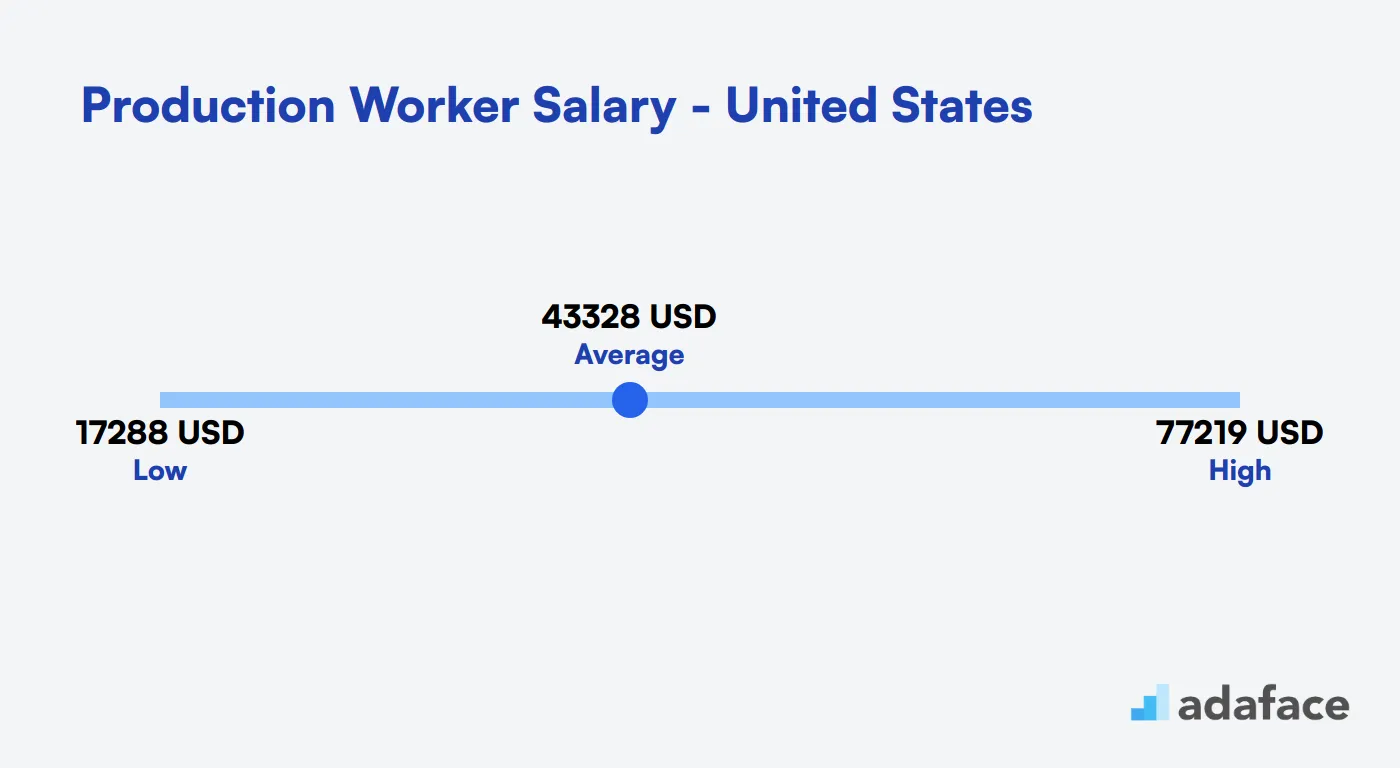
Production Worker Salary in the United Kingdom
Production workers in the UK earn an average salary of £22,000 to £28,000 per year. Entry-level positions start around £18,000, while experienced workers can make up to £35,000 annually.
Salaries vary based on factors like location, industry, and company size. London and the Southeast typically offer higher wages compared to other regions. Specialized skills or certifications can also boost earning potential.
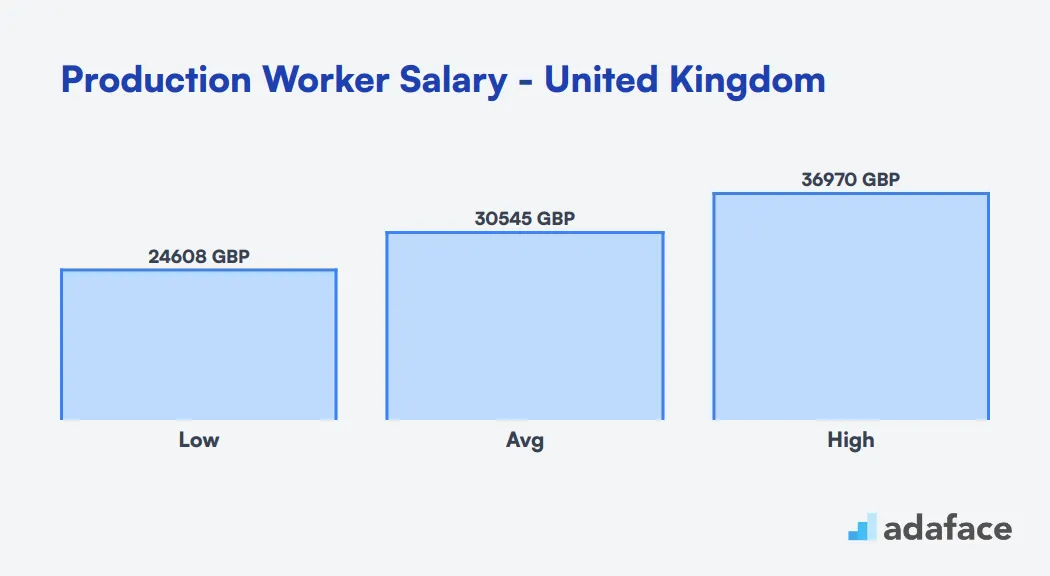
Production Worker Salary in Canada
In Canada, Production Worker salaries vary significantly depending on the region. On average, the salary ranges from CAD 28,000 to CAD 123,755 per year. For instance, in Chilliwack, BC, the average salary is around CAD 54,111, while in Winnipeg, MB, it stands at approximately CAD 44,228. These figures reflect differences in local demand and cost of living.
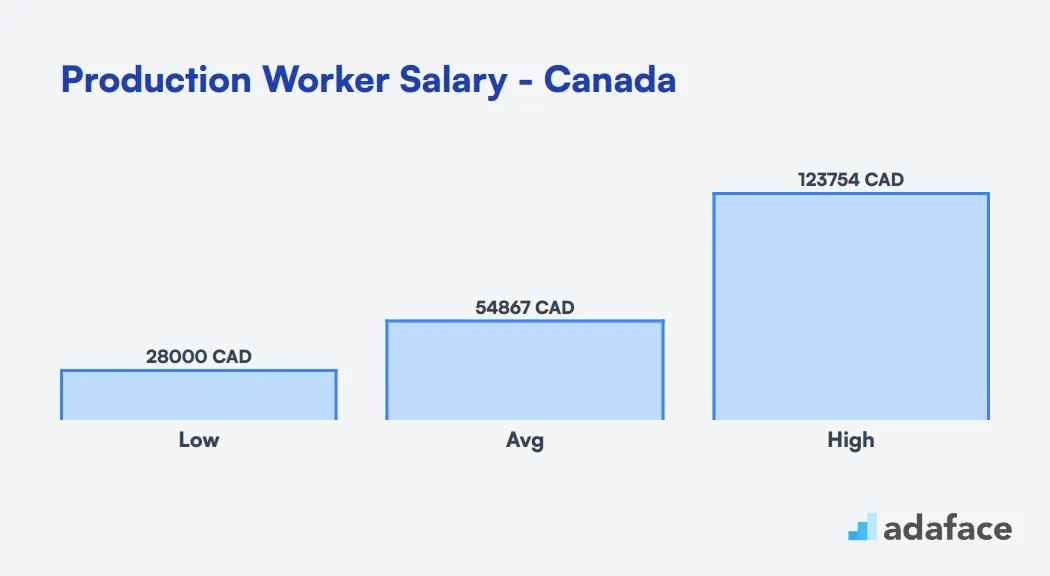
What's the difference between a Production Line Worker and a Manufacturing Technician?
Many people often conflate the roles of a Production Line Worker and a Manufacturing Technician, as they both operate on the production floor. However, these roles are distinctly different in terms of responsibilities, skills, and career paths.
A Production Line Worker typically has a high school diploma or GED and is involved in assembly, packaging, and material handling. They follow established procedures and work primarily on the assembly line in industries like general manufacturing and food processing. Their salary tends to range from lower to mid-level, with potential progression to team leader or supervisor roles.
Conversely, a Manufacturing Technician usually holds an associate's degree or technical certification. They are responsible for equipment maintenance, process optimization, and quality control. This role requires advanced technical skills such as equipment programming and troubleshooting. Technicians analyze problems and suggest improvements, often working in specialized industries like automotive or aerospace, with a salary that falls within the mid to upper range. Their career progression may lead to positions such as senior technician or production manager.
| Production Line Worker | Manufacturing Technician | |
|---|---|---|
| Education Level | High school diploma or GED | Associate's degree or technical certification |
| Technical Skills | Basic machine operation | Advanced equipment programming and troubleshooting |
| Responsibilities | Assembly, packaging, material handling | Equipment maintenance, process optimization, quality control |
| Decision Making | Follow established procedures | Analyze problems, suggest improvements |
| Work Environment | Production floor, assembly line | Production floor, technical workshops |
| Career Progression | Team leader, supervisor | Senior technician, production manager |
| Typical Industries | General manufacturing, food processing | Automotive, electronics, aerospace |
| Salary Range | Lower to mid-range | Mid to upper range |
Hire the Best Production Workers
In this blog post, we've explored why hiring production workers is important, what their roles entail, and the skills and qualifications to look for. We've also covered writing effective job descriptions, screening resumes, and conducting interviews to find the right candidates.
The key takeaway for hiring managers is to use clear job descriptions and relevant skills tests to enhance your hiring process. Attention to detail tests and problem-solving tests can be valuable tools in assessing candidates' capabilities. Using the right assessments helps ensure you are selecting the most qualified production workers for your team.
Attention To Detail Test
FAQs
A production worker is responsible for operating machinery, assembling products, performing quality checks, and maintaining a clean and safe work environment.
Look for skills such as attention to detail, manual dexterity, basic technical knowledge, teamwork, and problem-solving abilities.
Include a clear outline of responsibilities, required skills, and the company culture. Use specific language and avoid jargon to attract the right candidates.
Consider using job boards, staffing agencies, and specialized platforms that cater to the manufacturing industry.
Skills tests and assessments can be valuable tools. We have a range of tests like the Manual Testing Online Test to evaluate candidates’ abilities.
A production line worker typically focuses on assembly line tasks, while a manufacturing technician may handle more technical roles involving machinery maintenance and optimization.
Include a mix of technical and behavioral questions, practical tests, and discussions on past experiences to gauge both skills and cultural fit.

40 min skill tests.
No trick questions.
Accurate shortlisting.
We make it easy for you to find the best candidates in your pipeline with a 40 min skills test.
Try for freeRelated posts
Free resources



